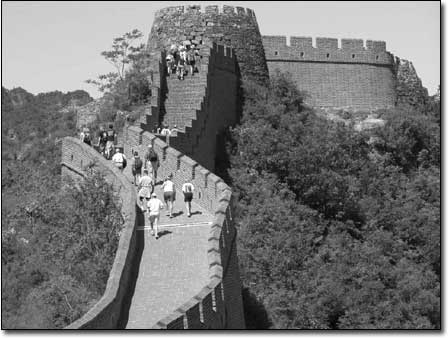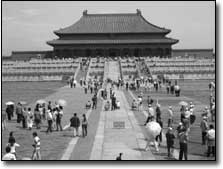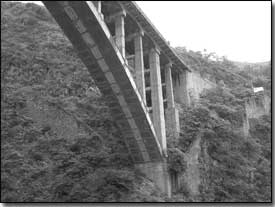
|
|
Racers make their way up one of many steep climbs during the Great Wall Marathon./Photo
by
Stan Rabbe. |
D on't put off your China travel plans any longer. China is changing
so quickly that this year's culture will be gone next year - literally.
And for those who live by the adage that "everything is changing quickly," you
really have no gauge until you've been to China. In May, Stan Rabbe and
I began our 17-day tour of China, a trip we believed would climax with
a run in the Great Wall Marathon. However, the excitement of running
on the Great Wall was actually eclipsed by the over two millennium of
history and culture that we experienced.
In Beijing we toured the Forbidden City, Temple of Heaven, Summer Palace,
Lama Temple, Mao's Mausoleum, Silk Alley, the Pearl Market, and three
major Imperial Gardens. In the early mornings we walked through Tiananmen
Square where soldiers stood guard and old men were flying kites a quarter
mile high. In public garden areas along the streets people were doing
Tai Chi, and their bird cages hung in the trees (the only singing birds
in the city). Vendors opened their stalls, noodle shops steamed up, male
and female military groups conducted running drills, street cleaners
worked with hand-made brooms, and bicyclists commuted to work.
 |
The familiar view of the Forbidden
City in
Beijing./Photo by Stan Rabbe |
Pedicabs carried us from the streets of modern Beijing to alley doorways,
which were the entrances to another world called "The Hutong," the old
neighborhood communities that are disappearing from sight. Each Hutong
gives access to private home entrances, a community toilet, and incorporates
ancient trees into the community courtyard areas. Only one Hutong section
has been designated to be saved; others are being razed to make way for
new high rise apartment buildings.
Construction is constant throughout all of China. Picture the skyline
vista of Beijing as a collage of construction cranes on every high rise
building in every direction. This picture characterizes the immense growth
and change that all of China is undergoing.
Eventually, we spent two days on The Great Wall: one for a site inspection
and another to run in The Great Wall Marathon. Huang Ya Guan is the section
of the wall we ran, and since it is a three-hour bus ride northeast of
Beijing, very few tourists visit it. Some of the section is in bad condition,
with uneven stairs (some of stone, some of bricks), railings to hang
on to, and in one part a footpath down a steep slope.
The marathon included two loops on the wall, each covering a vertical
ascent of 1,000 meters, and 1880 steps. All 600 runners were quickly
lost on the lengths of the wall and our vistas were absolutely clear
and gorgeous. We ran a long stretch through villages with locals standing
on the side of the road shouting exuberant hellos in English. Smiling
and laughing kids gave us high-fives, and old women collected our used
water bottles to recycle and sell water to tourists. It was more than
a marathon; "it is an adventure run," an "extreme event." It was terrific.
We left Beijing with accolades from the Chinese as heroes for running
a marathon on the Great Wall.
Xi'An is at the eastern end of the Silk Road and the site of Emperor
Qin's 6,000 Terra Cotta Warriors. Qin unified China, began work on the
Great Wall around 214 BC, and construction on his mausoleum took place
from 247-208 BC. The immensity and grandeur of Qin's army took our breath
away. Each warrior had an individual face, with a liking to the actual
person. There are horses, chariots, infantry, charioteers, archers and
generals. In Xi'An we also walked and rode tandem bikes on the wall surrounding
the old city, ate at a famous dumpling restaurant, shopped at the night
market, and practiced Tai Chi Fan Dancing with a Kung Fu Master at the
Wild Goose Pagoda.
 |
| “The beautiful mistake,” the Dragon
Gate Bridge on China’s Yangtze River./Photo
by Stan Rabbe |
In Sichuan Province we toured Chongqing, which has a population of 31
million, compared to Beijing's 13 million. The city center is reminiscent
of Times Square, and the cuisine is 4 Sichuan, hot and spicy (to beat
the summer heat from the inside out, they say). Sichuan is home province
to the Pandas, and at the zoo we saw several Lesser and Giant Pandas.
We toured the Stilwell Museum viewing the history of the Flying Tigers
during WWII, the engineering of the Burma Road and flights over the Burma
Hump to get supplies to the Chinese through Japanese forces. It was a
fascinating and sobering photographic history of American and Chinese
history.
A cruise on the Yangtze River took us 630 kilometers east and down river
from Chongqing to Yichang, the site of the Three Gorges Dam. In June
2003 they totally closed this part of the river for 13 days and raised
the water level 60 meters. The final level will be at 175 meters above
sea level. All along the Yangtze there are villages and farms that span
several centuries of cultural life. Everything lower than the 175 meter
marker is being evacuated and torn down. It will all be under water by
2009, and hundreds of thousands of people will be displaced. Some have
moved into the new high rise buildings built above 175 meters. The Dragon
Gate Bridge, which spans the entrance to The Three Little Gorges, was
built in the late 1980s. The Chinese call it "the beautiful mistake" because
it will be taken apart and rebuilt above the 175 meter mark.
We ended our tour of China in Shanghai, the ultra-modern city, with
a terrific skyline including the Oriental Pearl TV Tower. On the Bund
we joined Chinese runners and watched people doing Tai Chi in groups,
old men flying kites, a group of multi-aged women adapting Tai Chi to
popular songs like "Stayin' Alive," and large groups ballroom dancing,
all before 5:30 a.m. Shanghai's higher average income has new cars dominating
its roads and far fewer bicycle swarms than Beijing. This situation is
also changing in Beijing, where 1,000 new cars a week are put on the
streets and the number of bicycles is bring greatly reduced.
A day excursion on the train from Shanghai to SuZhou provided us the
experience of public transportation in China, which was efficient, clean
and easy. SuZhou is home to 60 remaining private gardens, some of whose
caretakers have been brought to the United States to design Chinese gardens.
We had great fun following intricate and ornate rock-patterned lanes
that often wound around themselves in a maze, with water and rock features
that are beautiful to look at in tight, intimate settings; unlike the
Imperial Gardens which are very large and extend over several hundred
acres with great vistas.
Beijing will be more than ready for the Olympics in 2008. If you can
get to China before then, you will experience a slice of culture that
will be forever gone. In many respects the guidebooks are years behind
in preparing you for China. The pollution factor in Beijing that existed
two years ago has been greatly mitigated; they have moved the factories
out of the city and all the cars have pollution controls - including
propane tanks in taxi cabs. The city is breathtakingly green with trees,
flowers and grass. The food was wonderful throughout the country and
menus were always in English or with pictures. We cannot recommend the
wine; however, the Chinese beer is excellent, plentiful and cheap.
We realized how little we know about China's history, and how her current
economy has a huge global impact on the U.S. and world. China is still
a very "foreign" country to visit, which made it extremely exciting and
challenging. The changing economy from socialism to capitalism has caught
a generation in between, with parents from the age of the Cultural Revolution
being cared for by the state but their children must provide for their
own health insurance and retirement. China is surpassing the U.S. in
its use of energy, steel, and oil. Not only is it a country to watch
for its change in culture, but also its economic positioning in global
power. After 2008, it will all be different.
|